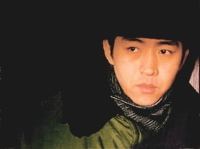A somber and methodical young man named Guan Jian (Tuo Zhong Hua) enters a bustling metropolitan police station and, without a scheduled appointment, asks for a personal meeting with the chief inspector (Hu Li) in order to file a formal complaint against a “village housewife” named Pu Fengying (Siqin Gowa) who, he unsentimentally admits, is his mother. As a clerk systematically collects the required procedural information to determine if the pursuit of a formal investigation is warranted, Jian produces his handwritten personal account of her suspicious behavior around the time of the incident and also a set of books that describes a case involving a Frenchwoman who had poisoned her husband by lacing the milk with arsenic and concealing her actions by claiming to be adding sugar: a modus operandi that triggers a memory surrounding the circumstances behind his father, Guan Shichang’s (Ma Jing Wu) unexpected death from cerebritis ten years earlier. Nevertheless, without incontrovertible proof or an eyewitness to the alleged crime, the official re-examination of a rural village school teacher’s death after a long, debilitating illness was unlikely and, when a police emergency arises, the chief inspector uses the convenient opportunity to summarily dismiss the inscrutable and dispassionate young man from the precinct. However, after conducting an inconclusive, cursory background investigation on the persistent, but diligent and socially upstanding Jian’s possible ulterior motives for his decision to inform on his mother, the chief inspector agrees to meet with him and listen to his childhood recollections of the events preceding his father’s death. The film then proceeds in flashback as Jian recounts a sad but familiar tale of a humble and austere existence in the small provincial town, reflecting on his parents’ passionless marriage, his uneducated mother’s modest vocation as a tofu peddler, his rescue (along with Fengying) after falling through the ice by an affable, well-intentioned woodsman named Liu Da-gui (Wai Zhi), and his father’s sudden, violent illness after rumors of an immodest, overly familiar relationship between Fengying and Da-gui begin to surface in the bucolic town.
Based on a real-life murder investigation in the Heilongjiang province in northern China, The Day the Sun Turn Cold is an exquisite, deeply affecting, and provocative examination of filial duty, estrangement, guilt, and longing. Incorporating the natural imagery of the forbidding winter landscape in the northern frontier, Yim Ho creates a haunting metaphor for the interminably oppressive environment of Fengying’s socially inescapable and moribund existence within the community’s traditionally patriarchal laws which, in turn, provides an astute, broader commentary on the marginalized role of all “village housewives”. Using sublime and indelible episodes that juxtapose images of light and warmth against the pervasive bleakness of their lives in the insular rural province, Yim further illustrates the underlying compassion and affection beneath the unsentimental and often irascible severity of Jian’s parents’ actions: the recurring imagery of Fengying’s perennially steam-filled kitchen as she prepares her daily batches of tofu for sale; her simple indulgence of occasional pipe smoking; Shichang’s playful outdoor arrangement of glowing candles inside hollow blocks of ice; Da-gui’s heated outpost where Fengying and Jian stop to seek refuge from the cold weather. By illustrating the seemingly insurmountable cultural, environmental, and economic disparity inherent between rural and urban communities, The Day the Sun Turned Cold evocatively captures the intangible toll of a brutal and emotionally erosive existence, and the innate inhumanity of an emotionally callous, alienated, and exacting soul.
© Acquarello 2003. All rights reserved.
